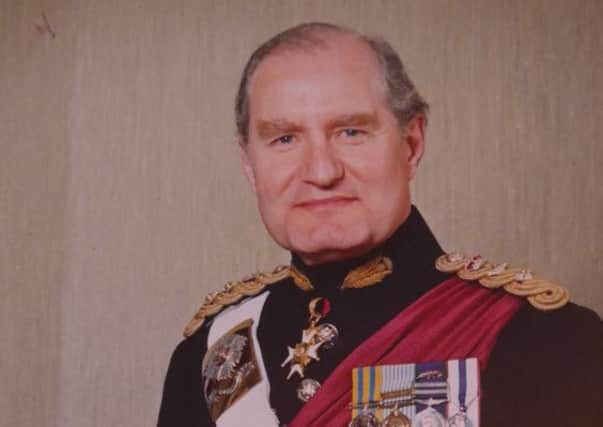Obituary: Lt General Sir Robert Richardson KCB CVO CBE, soldier


Bob Richardson was a fearless and blunt-speaking soldier who commanded his men with passion and respect through some of the darkest days of The Troubles in Northern Ireland.
He had been inspired to pursue a military career, rather than follow his father into the wine and spirits trade, by tales of wartime heroism and consequently found himself serving in various theatres of conflict with the Jocks who, in his opinion, were second to none.
Advertisement
Hide AdAdvertisement
Hide AdAlready mentioned in dispatches for his service with The Royal Scots during the Aden emergency in South Arabia, he took over responsibility for the Belfast area in 1974, the year that saw The Troubles hit the milestone of 1000 deaths. During his command there of the 39th Infantry Brigade some 21,000 men passed through the city, a state of emergency was declared, banks were blown up and judges murdered. Yet the security situation improved under his command and by 1982 he was in overall charge of the military in the Province, as General Officer Commanding (GOC), and was awarded a knighthood.
After retiring from such a distinguished army career he continued his connection with the military as administrator for the MacRobert Trust on Deeside, a charitable legacy borne out of the MacRobert family’s tragedy, and remained a man whose sense of service eptomised its motto, “Not For Self But For Country”.
The elder of two boys and with three older sisters, he was the son of Edinburgh wine and spirits merchant Robert Buchan Richardson and his wife Anne. After an education at the capital’s George Heriot’s School, he attended the Royal Military Academy, Sandhurst where he was a talented sportsman. He played rugby for Sandhurst and later captained the Army and Combined Services’ XVs while serving in the Suez Canal zone in 1954.
He was commissioned into the Royal Scots in 1949 and served in the British Army of the Rhine, seeing service at the end of the Korean War and in the Middle East with 1st Battalion. He was at the Defence Services Staff College India in 1960-61 and rapidly rose through the ranks, resulting in him being parachuted in, from his battalion in Germany to the Middle East, to take over as chief of staff of the Aden Brigade in 1967.
The situation in South Arabia had been deteriorating and the Crater district had been occupied by the terrorist National Liberation Front. The brigadier was on sick leave at the time and the area was the scene of ferocious street fighting. Richardson maintained a calm command until the British withdrawal that October.
He was appointed to command the 1st Royal Scots in 1969, around the start of The Troubles in Northern Ireland. Richardson was stationed with his battalion in Osnabruck but units from the Army of the Rhine were soon called in as reinforcements in Northern Ireland and The Royal Scots arrived in Belfast in March 1970.
The following month, 70 of the Jocks stood between Catholic and Protestant rioters of the Ballymurphy and Highfield Estates. Richardson had to deploy his entire battalion to restore order after 25 of his men were injured in the clashes.
The 1st Royal Scots undertook a second emergency tour of duty in Northern Ireland in 1971, this time to Londonderry, by which time his reputation, and that of his men, had preceded them and the tough Scots soldiers were soon called to assist a less hardy battalion which had been surrounded by a rioting mob on the Creggan estate.
Advertisement
Hide AdAdvertisement
Hide AdAt least a third of his Jocks were Catholic, although they were perceived as a Protestant battalion, but they reportedly remained impartial and simply got on with the job, acquitting themselves well. In 1974 he was appointed to command 39th Infantry Brigade, with responsibility for the entire Belfast area, and proved to have a fine understanding of the complex political and security situation that unfolded in the wake of opposition to the previous year’s Sunningdale Agreement, an attempt to establish a power-sharing executive.
After leaving Northern Ireland he returned to the British army of the Rhine, where he was deputy adjutant general at its HQ until 1978, when he became GOC of the British sector in Berlin. When he had previously been in Berlin he had made a routine duty visit to Hitler’s deputy, Rudolf Hess, then serving life in the city’s Spandau Prison after the Nuremburg trials. From the mid-1960s Hess was the jail’s only prisoner and, on visiting him again as GOC, Richardson, find